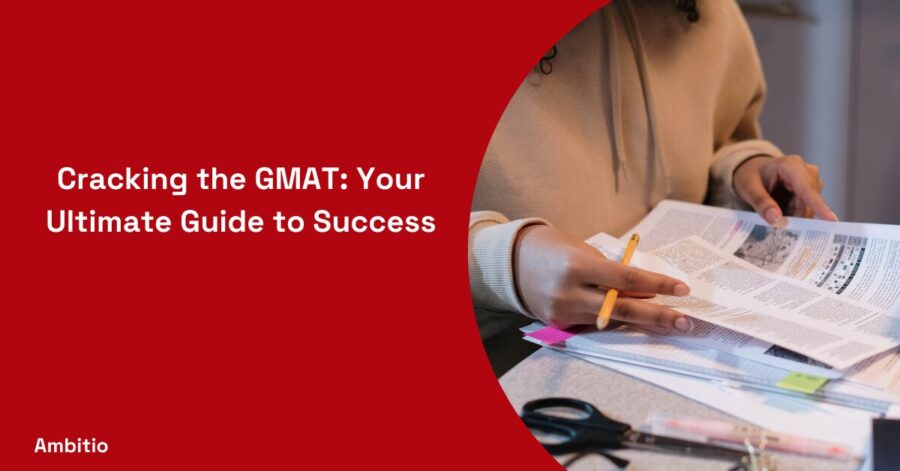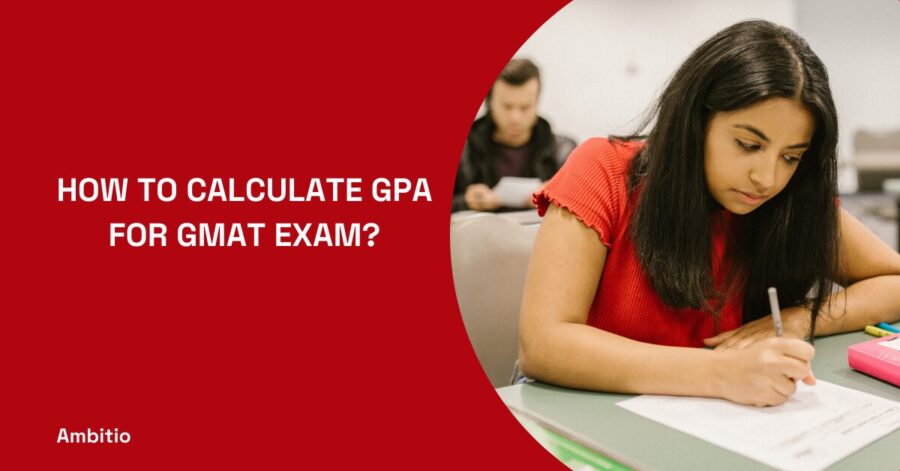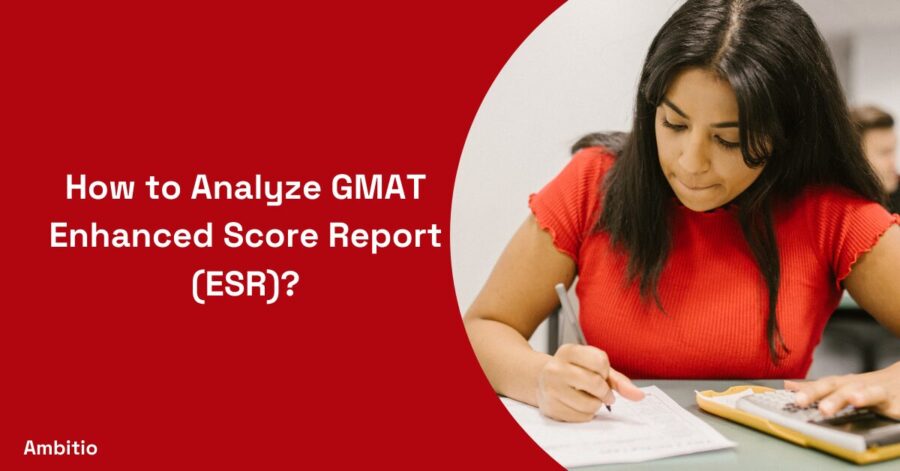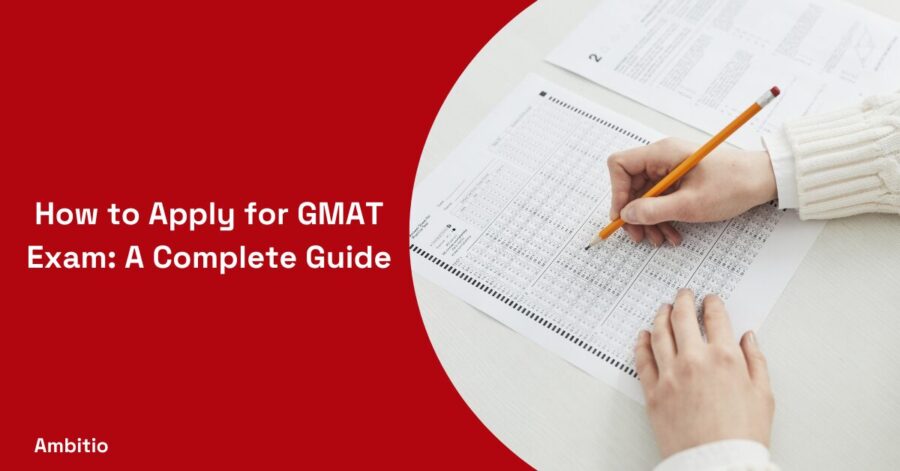20 March 2025
8 minutes read
How to Crack GMAT Exam in the First Attempt?

Key Takeaways:
- Cracking the GMAT requires consistent practice: Focus on understanding the syllabus and mastering time management to perform well on your first attempt.
- Identify and work on your weak areas: Use mock tests to pinpoint weaknesses and focus your preparation for better results.
- Stay calm and follow your plan: Trust your preparation, keep a clear mindset, and stick to your study schedule to achieve your target score.
Cracking the GMAT on your first attempt is no small feat, only 20% of test takers achieve their desired score. The truth is, many students struggle with time management, especially when balancing the tough quantitative and verbal sections. With complex question types like data sufficiency and critical reasoning, it’s easy to feel overwhelmed and unsure about how to approach the test.
However, the key to success lies in a strategic, focused approach. To crack the GMAT, start practicing with mock tests, identify your strengths and weaknesses, and stick to a comprehensive study plan. With consistent effort and the right preparation, achieving a good GMAT score on the first try is well within reach.
What are the different Sections of GMAT Exam?
Cracking the GMAT requires a solid understanding of its structure, including the four key sections that make up the exam: Verbal, Quantitative, Integrated Reasoning, and Analytical Writing Assessment (AWA). Each section tests different skills, and time management is crucial to tackle them effectively.

Whether you are preparing for the GMAT for MBA admissions or aiming for top business schools, knowing the breakdown of each section can help you plan your study approach. Here’s an overview for sections of the GMAT, time management tips, and scoring system:
| Section | Description | Time Management Tips | Key Focus Areas | Scoring System |
|---|---|---|---|---|
| Verbal Section | Tests reading comprehension, critical reasoning, and sentence correction. | Aim to spend about 1.5 minutes per question to manage the time effectively. Focus on the question type first. | Reading comprehension, Sentence correction, Verbal reasoning | 0–60 scale (with a maximum of 51 for Verbal) |
| Quantitative Section | Measures problem-solving and data sufficiency skills in areas like arithmetic, algebra, and geometry. | Allocate 2 minutes per question. Focus on data sufficiency and math topics like probability, statistics, and algebra. | Data sufficiency, Word problems, Arithmetic, Algebra, Geometry, Quantitative reasoning | 0–60 scale (with a maximum of 51 for Quant) |
| Integrated Reasoning | Tests the ability to analyze and synthesize data from multiple sources, with a mix of graphics, text, and tables. | Spend 2 minutes per question. Focus on reading and interpreting data quickly and accurately. | Multi-source reasoning, Graphics interpretation, Table analysis, Two-part analysis | 1–8 scale |
| Analytical Writing Assessment (AWA) | Requires writing an essay analyzing an argument. | Spend around 30 minutes to write a well-structured essay, ensuring clarity, coherence, and correct grammar. | Argument analysis, Logical structure, Clarity, Grammar, and English proficiency | 0–6 scale (scored by both a computer and a human grader) |
Effective Strategies for Cracking the GMAT
Cracking the GMAT requires a disciplined and strategic approach, as the exam tests a wide range of skills across multiple sections. Whether you’re aiming for a good minimum score like 730 or a perfect 780, effective GMAT prep can make all the difference.

A well-structured GMAT study plan is key to ensuring you are prepared for every section, from the GMAT verbal section to quantitative reasoning and Integrated Reasoning (IR). Here is the Complete GMAT Strategy Guide Set for Cracking the GMAT
- Practice Consistently: To crack the GMAT, you must solve a lot of practice questions—particularly data sufficiency questions in the quantitative section and sentence correction in verbal reasoning. The more questions you answer, the more familiar you’ll become with the format and nuances of the Core GMAT exam syllabus. Solving problems during your GMAT prep at regular intervals, such as every 16 days, helps reinforce learning and keeps your progress on track.
- Create a GMAT Study Plan: Whether you’re preparing for the GMAT in 1 month or 3 months, having a clear study plan is crucial. Focus on your target GMAT score while revising each section methodically. Incorporate mock tests and timed practice to build endurance. Aim to allocate GMAT time for each section of the GMAT, including verbal, quantitative, IR, and AWA, and target your weaknesses.
- Understand the GMAT Exam Structure: The GMAT test covers a wide range of topics—from math and reasoning to verbal and writing. Don’t just “accept the GMAT”—actively engage with each section and prepare with expert knowledge. The syllabus covers areas like quantitative topics, parallelism, critical reasoning, and reading comprehension, so practice solving a problem in each of these areas to improve your chances of getting a good score.
- Revise and Track Progress: Regularly revise the concepts and methods you’ve studied. This ensures that you not only memorize formulas but also understand their application in different question formats. Use the GMAT website to track your progress and get feedback. As you approach the test date, use mock tests to simulate the actual exam environment and help you manage time better during the actual test.
- Use GMAT Prep Resources: Comprehensive GMAT prep tools, model essays, and GMAT tests series will help you become more comfortable with the exam’s structure and timing. Many GMAT takers report that timed mock exams were instrumental in boosting their scores. By preparing for GMAT with a clear target, such as cracking the GMAT in 3 months, you’ll develop the necessary stamina to handle the pressure of the actual test.
With the right strategies, preparation, and mindset, cracking the GMAT can be a rewarding journey. Focus on answering each question correctly, manage your time efficiently, and aim to tackle each section of the GMAT with confidence to reach your desired score.
GMAT Preparation Tips to Crack GMAT on Your First Attempt
Cracking the GMAT on your first attempt requires more than just hard work—it demands smart strategies and focused preparation.
Here are 15 essential GMAT preparation tips that will help you tackle the exam with confidence and boost your chances of achieving a great score.
- Start with a Clear Target Score: Set a realistic target score based on your dream MBA program or top b-schools you’re applying to. This will give you a clear benchmark for your GMAT preparation and guide your study plan.
- Take the GMAT Early: Aim to take the GMAT within a timeline that gives you enough time to revise and retake it if necessary. Giving yourself enough time will reduce last-minute pressure and improve your chances of cracking the GMAT.
- Use GMAT Prep Resources: Make use of comprehensive GMAT prep resources, including the GMAT Test Guide, GMAT Course, official GMAT practice tests from GMAC, and other study guides. These resources will closely mirror the actual test format.
- Solve as Many Practice Questions as Possible: Make it a habit to solve practice questions from each section of the GMAT. This will help you become comfortable with the types of questions you’ll encounter and will improve your answering speed.
- Understand the Syllabus Thoroughly: Know the entire GMAT syllabus, from quant topics to verbal reasoning, so you can focus on areas you’re weak in. Be sure to review subject-verb agreement, data sufficiency, and the quant section in particular.
- Time Management is Crucial: Practice answering each question within the allotted time frame. Use a timer to simulate exam conditions and ensure you have enough time to answer all questions without rushing.
- Mock Tests at Regular Intervals: Schedule mock tests at intervals of every 16 days to track progress and adjust your study strategy. Mock tests help you identify areas for improvement and improve time management.
- Answer the Questions Strategically: Don’t accept defeat if a question seems tough—take your time, skip if necessary, and come back to it later if time allows. Focus on answering questions you know well before tackling tougher ones.
- Focus on Your Weak Areas: After every mock test, analyze your weak points and focus on solving problems in those areas. Whether it’s the verbal section or quant topics, dedicate extra study time where necessary.
- Revise Your Mistakes: Every wrong answer is a chance to learn. Review your mistakes thoroughly, especially the questions with multiple parts, so you can avoid making similar errors on the actual exam.
- Use the Note Board Wisely: During the exam, use the note board to jot down important information, formulas, or data to help you solve difficult problems. This will save you time and help you organize your thoughts.
- Work on Speed and Accuracy: Speed matters, but accuracy is key. Practice solving questions faster without compromising on correctness. Focus on getting the right answer rather than rushing through the test.
- Don’t Overthink: When you don’t know the answer, trust your instincts and avoid second-guessing. Overthinking can waste valuable time and lead to incorrect answers.
- Target Top MBA Programs: Keep your goal in mind—whether it’s to beat the GMAT to get into IIMs, other MBA universities, or top b-schools. A clear vision of your future goal will keep you motivated throughout your preparation.
- Review Your Strategy Regularly: Make sure you’re on track to crack the 45-day GMAT Study plan. Review your GMAT study plan regularly, and adjust it as needed based on progress.
By following these 15 preparation tips, you can effectively prepare for the GMAT and increase your chances of cracking it on your first attempt. Stick to a consistent study schedule, focus on your target GMAT Prep score, and remember that proper time management is the key to answering all questions correctly and efficiently.
How to Prepare for the GMAT in the Last Few Weeks
As you approach the final weeks before the GMAT, it’s important to fine-tune your preparation and focus on areas that will make the most impact on your GMAT score history. Cracking the GMAT requires not only understanding the syllabus but also refining your strategies for each section. In the last few weeks, focus on consistency and effective time management to ensure you are fully prepared to give the GMAT.
- Prioritize Mock Tests: In the final weeks, taking mock tests at regular intervals will help you simulate the actual exam experience. Allocate at least two hours on working days to complete these tests under timed conditions. This will improve your time to solve questions and help you build stamina for the real test.
- Review Incorrect Answers: Focus on reviewing the wrong answers from your mock tests. Take your time to understand why a particular answer was incorrect. This will help you avoid making the same mistakes on the actual GMAT and ensure you answer each one correctly.
- Master the GMAT Strategy: In the final weeks of the GMAT Exam Dates, work on answering questions quickly but accurately. Don’t accept defeat on tough questions; instead, skip and come back to them later if necessary. Focus on solving questions within the time constraints to improve your chances of getting the correct answers.
- Fine-tune Your Approach: If you’re preparing for graduate management programs like an MBA, your strategy should be based on your target GMAT max score. Whether you’re aiming to crack the GMAT in 2 months or you have a shorter timeline, staying consistent and focused on the exam format will be key.
- Stay Calm and Confident: As you prepare to take the GMAT, it’s important to maintain a calm and confident mindset. Don’t over-stress, and avoid cramming the day before the exam. Trust that your preparation has helped you get ready for this moment and remember, an average student can crack the GMAT with the right approach.
By following these steps and staying consistent in the last few weeks, you’ll be in a strong position to crack the GMAT and achieve your desired score.
Conclusion
Cracking the GMAT on your first attempt is entirely achievable with the right preparation and strategy. Whether you’re aiming to crack the GMAT in 3 months or need to answer each question correctly, focus on mastering the three parts of the exam.
Consistent practice, understanding the syllabus, and time management will really help you boost your chances of success. Remember, the key is to approach the GMAT confidently, without overthinking, and stick to your study plan.
If you need expert guidance on preparing for the GMAT, Ambitio’s personalized study plans and resources are here to help you ace the exam.
FAQs
How long should I prepare for the GMAT?
Ideally, 3-6 months of dedicated preparation is recommended. However, this varies based on individual needs and existing proficiency.
Are computer-adaptive practice tests important?
Yes, they are crucial as they mimic the actual test environment and help in adapting to the format of the GMAT.
Can I crack the GMAT on the first attempt?
Absolutely. With focused preparation and effective time management, cracking the GMAT on the first attempt is possible.
What is considered a good GMAT score?
A score of 700 or above is generally considered good, but this can vary depending on the requirements of your target business schools.
How important is the verbal section for non-native English speakers?
It’s very important. Non-native speakers should focus extensively on the verbal section to ensure a balanced and high overall score.
How can I stay calm during the test?
Practice relaxation techniques, stay positive, and focus on solving one question at a time confidently.
What strategies should I use during the exam?
Manage time wisely, eliminate wrong answers, and make educated guesses when necessary.

You can study at top universities worldwide!
Get expert tips and tricks to get into top universities with a free expert session.
Book Your Free 30-Minute Session Now! Book a call now




























